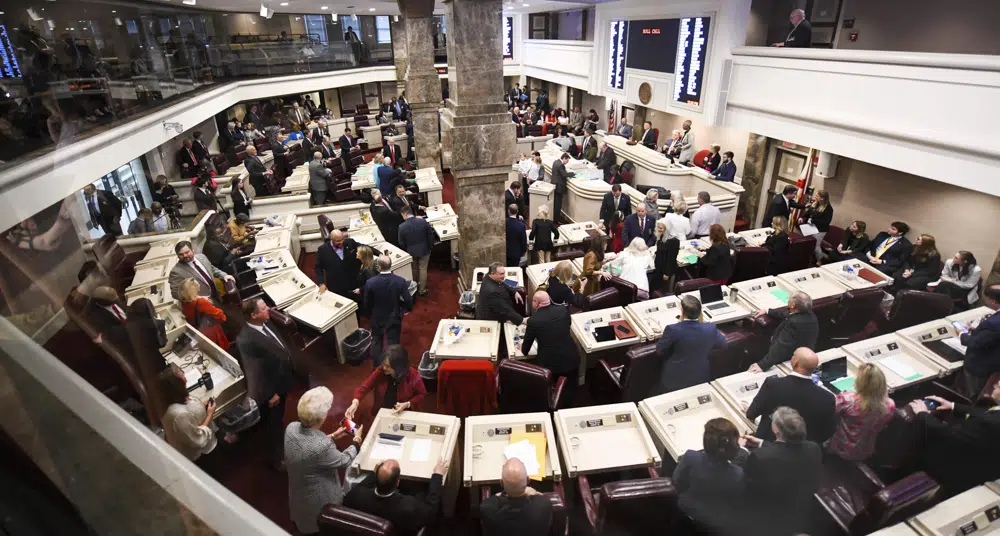Alabama House passes bill to cut back ‘good time’ incentives for inmates

On Tuesday, the Alabama House of Representatives voted to pass legislation that would decrease the amount of time inmates of Alabama’s prisons can get reduced from their sentences for good behavior while incarcerated. It also further limits which prisoners are eligible for good time incentives. Senate Bill 1 (SB1) – the Deputy Brad Johnson Act – is sponsored by State Sen. April Weaver. The legislation was carried in the House by State Rep. Russell Bedsole. SB1 is titled in remembrance of Bibb County Sheriff’s Deputy Brad Johnson – who was gunned down by a dangerous felon released by the Alabama Department of Corrections (ADOC) on good time. Bedsole – a Shelby County Deputy – said that passage of SB1 would make Alabama communities safer. “We know that we can’t totally solve crime in our communities. Just incarceration alone is not the answer.” SB1 reduces the number of reductions in sentences served that a prisoner can earn for good behavior, further limits the number of prisoners eligible for good time incentives, and requires ADOC to make reports on the application of good time incentives. “The reporting will come back to the legislature,” Bedsole explained. “We are not putting a mandate on them to go out and buy new reporting software.” House Minority Leader Anthony Daniels said that the abuses in the system occurred during the previous ADOC leadership. “It is not fair to hold the current leadership responsible for the failings of the past leadership,” Daniels said. State Rep. Phillip Pettus told Bedsole, “I appreciate what you have done on this. I hope that we don’t have another picture up here of another law enforcement officer up here.” State Rep. John Rogers called the bill “Overkill.” Rogers said the real problem is the lack of rehabilitation of prisoners in ADOC custody. “You have countries all over the world that rehabilitate prisoners, but we do not do it here in Alabama,” Rogers said. “Why would you punish the entire system? I hope that you pull this bill.” “You have got one guard for every 200 prisoners,” Rogers said. “We have had four women get pregnant in prison in a women’s prison. How does a woman get pregnant in all women’s prison?” “We need new prisons, but you have to have money to pay guards a decent wage,” Rogers said. Bedsole said, “Did you know that a person who commits a murder in prison can still get good time?” Rep. Christopher England said, “For 100 and some years, Democrats controlled the Legislature. You know one thing that Democrats absolutely screwed up? Prisons and justice. Then Republicans got in there. For six years, we created class D felonies – everybody doesn’t like that now – Community corrections, drug courts, and we worked on releasing prisoners. You know what happened? Crime went down, and the number of prisoners went down. We had a horrible tragedy happen in Marshall County (the Jimmy Spencer slayings of three people while on parole). In November 2019, we reformed the parole system. Now we aren’t letting anybody out. The new Republicans that are here have completely unraveled how we deal with prisons. The prison population has also skyrocketed. You know what also happened: crime skyrocketed. Now it has gotten to the opposite extreme where we don’t let anybody out. The parole board is only giving parole to ten percent of prisoners eligible for parole.” “You know what else has happened – crime has gone up,” England said. “We need all the space and resources we can get, and we are wasting it on people who are no danger to the community.” England said that releasing prisoners on parole where they are under supervision is better than waiting for the end of their sentence and then releasing them with no supervision requirements. “Over 90% of the people that go into the prison system get out,” England said. “Would you rather them get out with supervision or with no supervision?” Rep. A.J. McCampbell said, “As a former law enforcement officer, we recognize that every day we are putting our lives on the line. I hate what happened to Officer Johnson. I really do.” “We have got a lot of calamity and failure of our whole (prison) system,” McCampbell continued. “We don’t have any real solutions.” “It is unreal how many people have been denied,” McCampbell said. “Parole is supposed to be at a time where we have an opportunity to look at people while they are out in the community.” “The mistreatment that they receive in these institutions dehumanizes these people,” said Rep. Mary Moore. Bedsole said that SB1, “Revises our good time statute that has been in place since 1980. We are changing the amount of good time days we are offering. We are lowering them.” After a lengthy debate, the House of Representatives passed SB1. As it has already passed the Senate, it now has gone to the Governor’s office for her consideration. According to the synopsis, SB1 would, “Reduce the amount of correctional incentive time a prisoner receives; to require a prisoner to remain in a certain classification for a longer period of time before moving up to a higher classification; to provide for additional circumstances in which a prisoner may be required to forfeit his or her correctional incentive time; and to require the Department of Corrections to provide annual reports to the Legislature, the Governor, and the Attorney General regarding correctional incentive time. Thursday will be day 10 of the 2023 Alabama Regular Legislative Session. The Alabama Constitution limits the Legislature to no more than thirty legislative days during a regular session. To connect with the author of this story or to comment, email brandonmreporter@gmail.com.
House committee gives favorable report to bill to deny parole to felons

On Wednesday, the Alabama House Judiciary Committee voted to advance legislation that would deny parole to convicts who are facing additional charges with new serious offenses. House Bill 131 (HB131) is sponsored by State Rep. Wes Kitchens. “This deals with a loophole that came up in the Jimmy Spencer case,” Kitchens said. “This helps close that loophole up.” According to the synopsis, “Under existing law, prisoners in the custody of the Department of Corrections are eligible for parole in certain circumstances. This bill would provide that a prisoner is not eligible for parole if he or she has been duly charged with a new offense that has not been disposed.” “If you are a prisoner facing serious charges that carry penalties by more than six months and you can’t be up for parole,” Kitchens said. The Alabama House Judiciary Committee voted to give HB131 a favorable report in a unanimous vote. The issue that sparked this concern was that Career criminal Jimmy Spencer came up for parole even though he was then facing three charges of capital murder for the slayings of Colton Lee, Martha Reliford, and Marie Martin. Crimes he committed after the previous Parole Board granted him parole even though he was serving two life sentences. Alabama Governor Kay Ivey replaced the Board members in the wake of this and other debacles with leniency that was widely condemned as reckless. The new Parole Board denied Spencer’s parole application, but that could have ended differently with more lenient parole commissioners. The sponsor claims this legislation is designed to close that loophole in existing statutes. The Alabama Bureau of Pardons and Paroles oversees the state’s parolees. The Parole Board hears inmates’ requests for both pardons and paroles. HB131 could be considered by the full Alabama House of Representatives as early as Thursday. Thursday will be day seven of the 2023 Alabama Regular Legislative Session. To connect with the author of this story or to comment, email brandonmreporter@gmail.com.
Alabama AG’s office says triple murder suspect was ‘improperly categorized’ for parole

After spending over 30 years in prison Jimmy Spencer was paroled in January 2018. Months after being released, he has found himself behind bars yet again, accused of slaying three people in Guntersville, Ala. — 65-year-old Martha Dell Reliford, 74-year-old Marie Kitchens Martin and Martin’s great-grandson, 7-year-old Colton Ryan Lee. Now, the Alabama Attorney General’s office is saying Spencer was paroled only because he was mis-categorized as a “non-victim” offender in the system. “Mr. Spencer was improperly categorized as a ‘non-victim’ offender,” said Mike Lewis with the Alabama Attorney General’s Office, according to WHNT News 19. “As a result, our Office of Victim Assistance was not alerted to his violent past. This case also raises concerns with the Paole Board’s risk assessment procedures and whether the implementation of this process is failing the public. The Attorney General grieves the loss of life and is working with prosecutors and law enforcement from around the state on a solution to the issues raised in this case.” Spencer’s criminal past From the Alabama Department of Corrections: Spencer, 52, was first sentenced to prison in July 1984 to one year for third-degree burglary in Franklin County. Later he was charged and convicted of a prison escape in September 1984 and received a 10-year sentence. Spencer again received another 10-year sentence to run consecutively with his prior sentences for a second escape conviction in May 1985. Spencer was paroled by the Alabama Board of Pardons and Paroles in July 1988. His parole was revoked in January 1989 for a second-degree burglary conviction in Franklin County. He received a life sentence in February 1990 following the conviction. Spencer again escaped from prison on March 14, 1993, and was recaptured May 16, 1993. He was charged and convicted of unlawful breaking and entering a vehicle and third-degree burglary during his escape and received two 16-year sentences for each conviction to run consecutively with his life sentence.” While serving his prison sentence, Spencer was charged and convicted of second-degree assault of an inmate and received a 15-year sentence. Spencer received a second parole from the Board of Pardons and Paroles and was released from prison on January 22, 2018. He now stands charged with seven counts of murder in his killing of three victims. Murder during the commission of a first-degree robbery, for the murder of Reliford Capital murder for a murder committed while serving a life sentence, for the murder of Reliford Murder during the commission of first-degree robbery, for the murder of Martin Capital murder for a murder committed while serving a life sentence, for the murder of Martin The murder of two or more people at one time, for the murders of Martin and Lee The intentional murder of a child under 14-years-old, for the murder of Lee Capital murder for a murder committed while serving a life sentence, for the murder of Lee Consequences of the Parole Board’s decisions The Parole Board has made headlines as of late as they’ve been scrutinized for decisions beyond that of granting Spencer parole. Two Florence, Ala. men, Michael Prater and Darnell Rice, were both released this year despite objections from prosecutors. Prater, who pled guilty to aggravated stalking and escape and was sentenced to 15 years, only served four before the Parole Board released him. Meanwhile, Rice only served seven years of a 20 year sentence for shooting a man. Meanwhile Kayla French was released just last month after serving only two years of a 13 year sentence for stabbing her ex-boyfriend’s new girlfriend four times — including once in the heart.
Three Robert Bentley appointees increase Alabama parole rate to 54 percent

Three gubernatorial appointees sit on the Alabama Pardon and Parole Board. Collectively the have the power to override a judge’s decision (we’ve been telling you just how important these appointments are) and grant Alabama prisoners parole as they see fit. And in FY 2017 the Parole Board, then comprised of three appointees made by former Gov. Robert Bentley, considered 7,098 paroles, of which 3,847 were granted. This resulted in an overall grant rate of 54 percent. Importance of the Parole Board More than 20,000 people are locked up in Alabama prisons. According to the Alabama Department of Corrections (ADOC), state facilities are are at 160 percent of their intended occupancy as they’re collectively designed to hold only only 13,000 prisoners. While the State Legislature added an additional $85 million for the state prison system over the next two years — to address the prison’s mental health systems, following U.S. District Judge Myron Thompson‘s declaration that the state has failed to provide mental health care to the state’s prison population and is in violation of the Eighth Amendment’s prohibition on cruel and unusual punishment — lawmakers have yet to tackle fully he systemic problem of overcrowding. Enter the Alabama Pardon and Parole Board — part of the state’s answer to helping reduce prison overcrowding. Since the passage of the Justice Reinvestment Act (Act 2015-185) in 2015, the board has been tasked with implementing specific reforms targeted at reducing the prison population. According to the Board’s FY 2017 Annual Report, the Justice Reinvestment Act “requires a clear definition of the parole standard of release and establishment of actuarially based ‘parole guidelines,’ which include reasons for granting and denying parole. Reforms involving the Board’s paroling process achieve greater transparency for the public, crime victims, inmates, and system stakeholders regarding the process, itself, and factors guiding release decisions.” Who’s on the Board now? The Board currently is made of two Bentley appointees and one made by Gov. Kay Ivey — Clifford (Cliff) Walker (effective Nov. 2013) and Lyn Head (effective Sept. 2016) were both made by Bentley. Meanwhile Dwayne Spurlock (effective May 2018) was made by Ivey. Each of them were subject to confirmation by the Alabama Senate and are serving a six year term. Consequences of a decision? The Parole Board has made headlines as of late (that would be the two Bentley appointees and one Ivey appointee) for granting parole to an inmate who was serving a life sentence. Jimmy Spencer was paroled in January 2018. Months after being released, he is now accused of killing three people in Guntersville, Ala. Spencer is now behind bars yet again. But he’s not the only one to be paroled amid scrutiny. Two Florence, Ala. men, Michael Prater and Darnell Rice, were both released this year despite objections from prosecutors. Prater, who pled guilty to aggravated stalking and escape and was sentenced to 15 years, only served four before the Parole Board released him. Meanwhile, Rice only served seven years of a 20 year sentence for shooting a man. Meanwhile Kayla French was released just last week after serving only two years of a 13 year sentence for stabbing her ex-boyfriend’s new girlfriend four times — including once in the heart.


